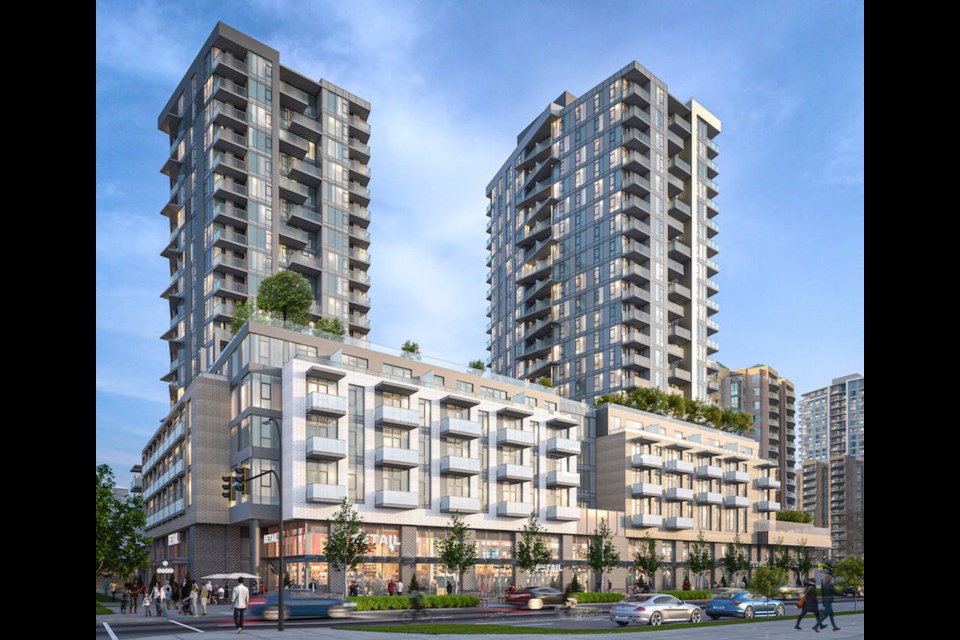Victoria council has approved in principle a massive reinvention of the Harris Green neighbourhood, but with a green twist that includes a big reduction in parking spaces.
Councillors have stipulated that Toronto-based Starlight Developments would have to make buildings in the second and third phases all-electric for energy needs, provide less on-site parking than proposed, and add green transportation amenities such as bus passes, and bike parking and charging.
Car parking stalls would drop to no more than 0.34 per dwelling unit in the second and third phases, down from 0.52 stalls in the first phase. Early plans had called for 900 parking spots for the entire project, which would have worked out to about 0.6 stalls per unit.
Council voted 8-1 — Coun. Stephen Hammond voted against — to approve rezoning and amendments to the official community plan that will allow Starlight to reimagine the 1000 and 900 blocks of Yates and View streets in a project that’s expected to unfold over three phases.
On Friday, Starlight said it was still absorbing the changes introduced at Thursday evening’s final public hearing, and declined to offer comment.
Mayor Marianne Alto said it’s unlikely Starlight was caught off guard by the amendment.
“Anyone who was paying attention would be seeing very visible and quite obvious examples of a shift in this new council’s position around the priorities of both climate and housing and how they’re very definitely balancing the two.”
She noted the new council has already approved two projects that had been rejected by city staff for having inadequate parking. “In both cases, council said: ‘Thank you very much for your excellent advice, staff, but actually we’re going to advance them even without parking because we have different priorities now.’ ”
Alto said Starlight will work with city staff to determine how they can meet the new requirements, with proposals to come back to council for final approval.
She hopes council’s decision will guide the next series of developments in the city.
The Harris Green project indicates a commitment to and confidence in the city, Alto said. “This will be a showpiece for the city and a showpiece for the applicant.”
The plan is to tear down all the commercial buildings on the two blocks to make way for a project that will include residential towers with an estimated 1,500 rental suites, more than 100,000 square feet of commercial buildings, and green space.
Hammond echoed the concerns of dozens of members of the public who told council they felt the project is too big. “The difficulty for me, and I may be the only one voting against this, is that I just find it’s too tall. Not just for my liking, but actually for the OCP and the downtown core area plan,” he said. “It’s too small of a space and too dense.”
Coun. Jeremy Caradonna, who proposed the amendments to the plan Thursday night, argued Harris Green is the right place for density and the amended project would be more climate and lifestyle friendly.
“It’s right in the core of downtown. I think we would all agree that that part of Harris Green really needs a refresh,” he said.
While he acknowledged he had issues with the height of the towers — the tallest of the five would be 32 storeys — Caradonna said he was won over by the sheer number of housing units being provided and the fact the anchor commercial tenants London Drugs and Market on Yates would be staying.
“On balance, we cannot turn down 1,584 units of purpose-built rental and 80 units of affordable housing,” he said.
Coun. Matt Dell said projects like Harris Green will make a huge difference in tackling the housing shortage.
“This undoubtedly is the mothership of the big projects,” he said. “I can’t fathom how someone could look at this and say it’s not needed in our city.”
Coun. Dave Thompson said the project would make Starlight a leader in sustainable urbanism, while breathing new life into the neighbourhood, supporting downtown business and addressing climate issues by building up in an urban area rather than spreading to the suburbs. “If we’re going to be having 6,000 more people added to this region every year, they’re either going to be in built-up areas that are walkable or they’re going to be in distant, car-dependent areas.”
Starlight is working with the city on how it will deliver more car-share vehicles, increase the number of bike stalls to at least 2,500, ensure at least 50 per cent of bike parking stalls have access to electric charging, and provide new tenants with bus passes.
There is no set timeline for the work to get done, though Alto said she hoped it would be a matter of weeks.
>>> To comment on this article, write a letter to the editor: [email protected]



